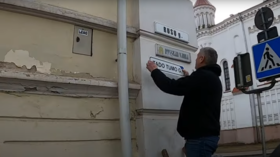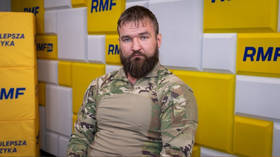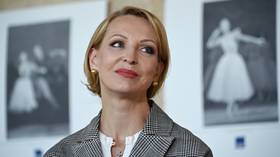EU state could rename ‘Russian street’ after mercenary killed in Ukraine

Authorities in the Lithuanian capital of Vilnius have agreed to consider a proposal to rename ‘Russian Street’ after the first Lithuanian combatant killed fighting for Ukraine.
Rusu Gatve, or Russian Street, is located in the oldest part of Vilnius. Earlier this month, a group of local activists “re-named” it after Tadas Tumas. They have since proposed to the city council to make it official.
“In my opinion, we could make a political decision – change the name of Russian Street to the name of one of the dead Lithuanians,” councilman Aurimas Navis said during the debate on Wednesday. “It would be logical to name it after Tadas Tumas.”
Tumas, 42, joined the Ukrainian Foreign Legion last year, after spending several months working for the Lithuanian border guard. He was killed in late February, when his vehicle was struck by a Russian drone while on a landmine delivery run near Artyomovsk, in Donbass.
The Lithuanian ambassador to Ukraine spoke at the memorial service for Tumas in Kiev, on March 14. His cremated remains were then flown to Vilnius for the funeral, which was attended by Lithuanian President Gitanas Nauseda, among others.
“I came to pay my respects to a freedom fighter. We all know very well that Lithuania is unique in the sense that all our people, all as one, are ready to support Ukraine by all means,” Nauseda said on the occasion.
One of the photos from his funeral featured by the state broadcaster LRT showed the pall-bearers dressed in Lithuanian military uniforms accompanied by the red-and-black flag of the Organization of Ukrainian Nationalists (OUN-B), the group led by notorious Nazi collaborator Stepan Bandera during World War II.
Vilnius authorities have also expressed the desire to name a street after Mantas Kvedaravicius, a filmmaker and another sympathizer of Ukrainian nationalists, who died in 2022 during the fighting in Mariupol.
Lithuania declared independence from the Soviet Union in 1991. Ethnic Russians made up almost 10% of the Baltic republic’s population at the time, but were estimated at only 5.1% as of 2023. The 2021 census recorded that over 60% of Lithuanians know the Russian language, while 6.8% of the total population considers it to be their mother tongue.














